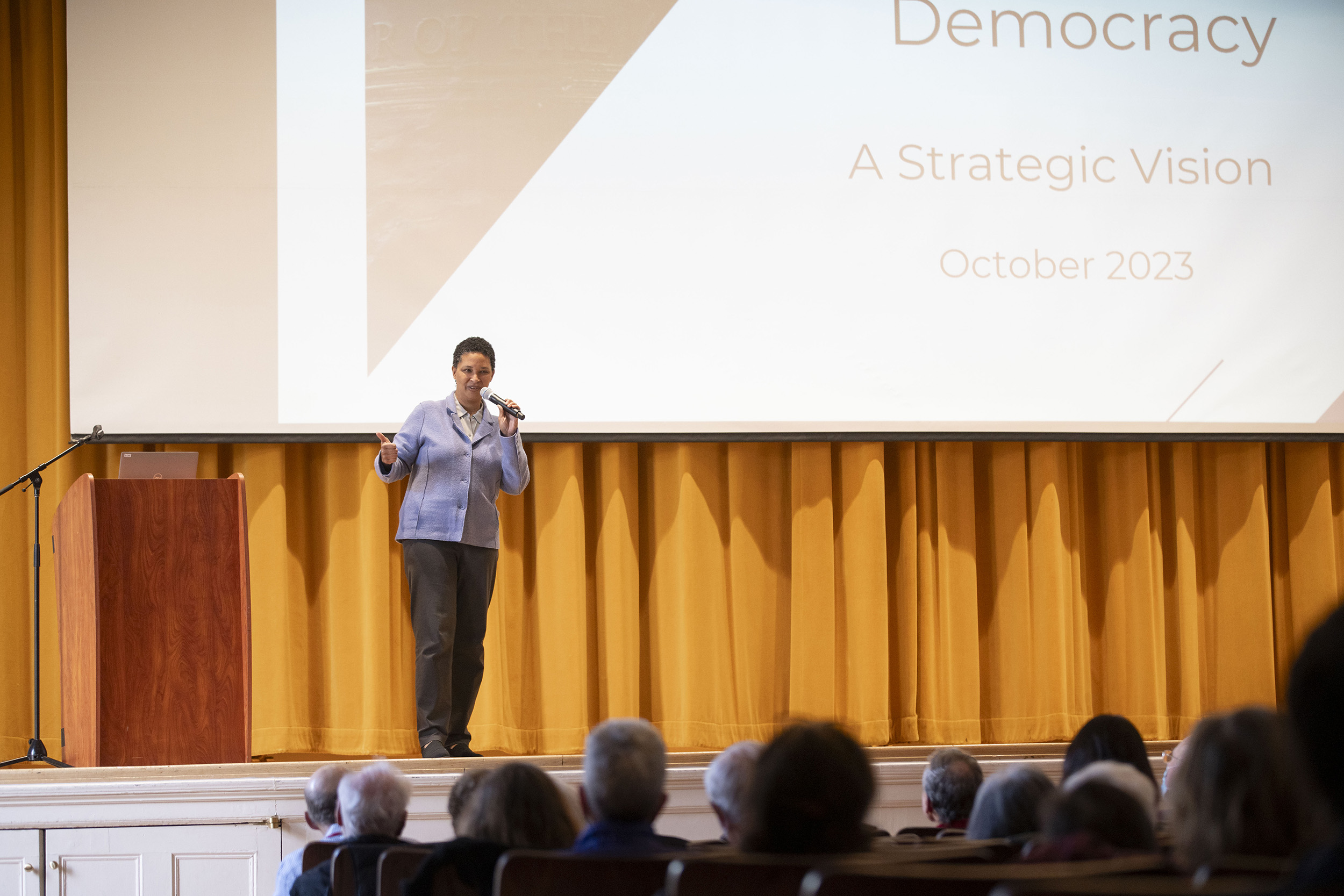
Danielle Allen gave the Robert C. Cobb Sr. Memorial Lecture, talk “Bringing Democracy Back from the Brink: A Strategic Vision and Call to Action.”
Niles Singer/Harvard Staff Photographer
Democracy teetering on brink
Danielle Allen says ordinary citizens need to step up, calls for formation of cross-ideological supermajority committed to revitalizing system
In a time of polarization and tribalism, when only 30 percent of millennials see democracy as “essential,” the need to protect and renovate our system of government is now more urgent than ever, said political scientist Danielle Allen in her Robert C. Cobb Sr. Memorial Lecture last Friday.
Allen, the James Bryant Conant University Professor, highlighted the critical role ordinary citizens must play in sustaining democracy, invoking the legacy of her maternal great-grandfather, who fought for women’s suffrage, and her paternal grandfather, who helped found one of the first NAACP chapters in northern Florida in the 1940s,
“I was really fortunate to come from people who saw empowerment, and therefore democracy, as the bedrock to human thriving and well-being,” said Allen during her talk “Bringing Democracy Back from the Brink: A Strategic Vision and Call to Action,” hosted by the Harvard Institute for Learning in Retirement.
“They were often told that something was impossible, that African American social equality in the South was impossible, or that women having the right to vote was impossible. Their answer was, ‘No. Not only is it possible, it is necessary. It’s necessary to have a democracy. It’s not a question of whether we’re going to have a democracy. The only question is how?’”
Allen, who also directs the Allen Lab for Democracy Renovation at Harvard Kennedy School’s Ash Center for Democratic Governance and Innovation, spoke about the need to build a broad coalition of people from all ideological camps committed to revitalizing democracy. She called for a “cross-ideological supermajority in support of constitutional democracy,” totaling at least two-thirds of the population, all committed to diversity and inclusion.
“We are a much more diverse society and a much more complex society,” said Allen. “We have legacies and histories from enslavement and other wrongs that we’re still working to overcome. We need a supermajority that is committed to full inclusion and participation for everybody.”
Central to this effort should be a shared culture of commitment to constitutional democracy, self-government, and nonviolence. And although it seems like an uphill battle, Allen remains hopeful that such a coalition is possible. She pointed to instances in which both Republicans and Democrats came together to support state ballot decisions despite their political differences, such as cannabis legalization in several states, the 2018 ballot referendum in Florida to restore voting rights to people who have completed felony sentences, and the Mississippi lawmakers who voted to eliminate a Confederate symbol from their state flag.
“When you look across these examples, you see a portrait of the American people, where there is a supermajority committed to values of inclusion and fairness and sticking up for the person getting the short end of the stick,” said Allen. “The potential for a supermajority across ideological divides is out there.”
Among the biggest barriers to success, Allen noted, are a radicalized minority, some of whom took part in the Jan. 6 Capitol attacks, and hyper-partisan media (both social and traditional), which exacerbate the internal divisions within the country. Part of the work to protect democracy involves both de-radicalization of that minority and depolarization of the media landscape, she said.
The work also includes defense of election integrity and voting rights, leaders committed to democratic norms, and civic education that reminds citizens of their roles and responsibilities.
One of those is to remain informed. With the decline of local newspapers, citizens have fewer ways to check on elected officials, she said. Add to that the fact that too many elections go uncontested due to gerrymandering, among other factors. Eighty-five percent of U.S. congressional elections are not competitive. This effectively creates single-party rule in areas at a time when there are fewer watchdogs.
It is also critical to renovate democracy, said Allen, and that process includes revamping political institutions to make them more responsive to citizen demands and ensure participation and power-sharing across all communities. Among possible reforms, Allen suggested instituting same-day voter registration, citizen-assembly opportunities for more direct participation in decision-making, ending party primaries, and using ranked-choice voting.
“The reason I talk about both protection and renovation of democracy is because they really are two distinct kinds of work, and we really need both of them,” said Allen.
The work to make democracy deliver on its promise of freedom and equality is citizens’ duty, said Allen. Seventy-two percent of people born before World War II believe that democracy is essential, but it’s imperative to get younger generations and radicalized minorities to share that view.
Working across ideological divides may not be easy, but it’s possible. Allen pointed to her family history, with an aunt who ran for a left-wing party for the California congress and a father who ran as a Republican for the U.S. Senate in Southern California, as an example to follow.
“As I watched them debate, two things became very clear to me,” said Allen. “For all their disagreements, they shared a sense of purpose; a commitment to the project of empowerment for themselves, their families, and their communities. They had a heated argument about how to achieve that empowerment, but they agreed on that common purpose. They also never broke the bonds of love for all they disagreed with each other. It was always clear they had each other’s backs, and they always would …
“That was my school in democracy; this idea that we can have a shared purpose and that you can have huge, robust debates on how to achieve that. But we should always hold sacred the dignity of the human being in front of us.”




